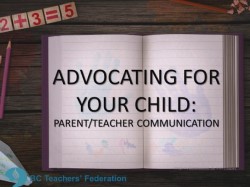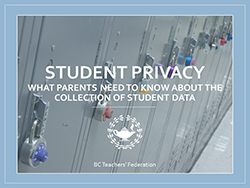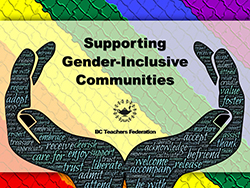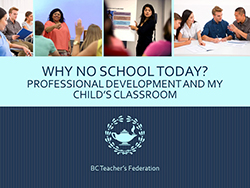2. Book the Workshop
These workshops must be booked at least four-five weeks prior to the workshop to allow us time to arrange presenters. The presenters are all volunteers and donate their time and expertise to assist and broaden the knowledge of parents.
For questions or assistance please contact Karen Cheung at kcheung@bctf.ca.
Aboriginal Content in the Curriculum: Exploring Historical Relationships between Indigenous and Non-Indigenous Peoples
(3 hours)
 This experiential workshop will help participants understand how colonization of the land we now know as British Columbia and Canada has impacted the people who lived here long before settlers arrived. Through this exercise participants will explore the nation-to-nation relationship between Indigenous and non-Indigenous peoples in Canada, how this relationship has been damaged over the years, and how we can work toward reconciliation.
This experiential workshop will help participants understand how colonization of the land we now know as British Columbia and Canada has impacted the people who lived here long before settlers arrived. Through this exercise participants will explore the nation-to-nation relationship between Indigenous and non-Indigenous peoples in Canada, how this relationship has been damaged over the years, and how we can work toward reconciliation.
Advocating for your child
(90 minutes)
 Communication between parents, teachers, and other school staff is an important factor in your child’s education experience, but often parents struggle with navigating through a sea of education jargon and unfamiliar processes. Parents know their children the best, and so should be the best advocates for them, even in difficult situations. This workshop will give parents the tools they need to make the most of every opportunity to communicate with teachers.
Communication between parents, teachers, and other school staff is an important factor in your child’s education experience, but often parents struggle with navigating through a sea of education jargon and unfamiliar processes. Parents know their children the best, and so should be the best advocates for them, even in difficult situations. This workshop will give parents the tools they need to make the most of every opportunity to communicate with teachers.
Antibullying
(90 minutes)
 Bullying behaviours are no longer acceptable in our society and schools are working hard to do something about this. This introductory session on antibullying will include the definition, the bullying triad, the cycle of bullying, and the signs to watch for if your child is being bullied. Participants will also learn and share strategies for bully-proofing children and schools.
Bullying behaviours are no longer acceptable in our society and schools are working hard to do something about this. This introductory session on antibullying will include the definition, the bullying triad, the cycle of bullying, and the signs to watch for if your child is being bullied. Participants will also learn and share strategies for bully-proofing children and schools.
Problematic Future: Special Education Funding
(90 minutes)
 This interactive workshop will help parents explore the government-proposed prevalence funding model for special education in BC’s public schools. Participants will discuss what an inclusive education should look like for all students in BC’s classrooms, and the barriers to inclusion that families with students with special needs face. The workshop will also touch on the impact that the teachers’ collective agreement has on inclusion, particularly local class size and composition.
This interactive workshop will help parents explore the government-proposed prevalence funding model for special education in BC’s public schools. Participants will discuss what an inclusive education should look like for all students in BC’s classrooms, and the barriers to inclusion that families with students with special needs face. The workshop will also touch on the impact that the teachers’ collective agreement has on inclusion, particularly local class size and composition.
So We Have a Revised Curriculum: What Does This Mean for My Child?
(90 minutes)
 BC has a revised curriculum that will be implemented gradually, beginning in the fall of 2016. Many parents are concerned about what this will mean for their child. What will change? Will all learning be personalized? Will this way of learning suit my child? This workshop will answer these questions by exploring elements of the new curriculum, comparing the past curriculum with the revised curriculum, and highlighting the ways that parents can support their children’s learning.
BC has a revised curriculum that will be implemented gradually, beginning in the fall of 2016. Many parents are concerned about what this will mean for their child. What will change? Will all learning be personalized? Will this way of learning suit my child? This workshop will answer these questions by exploring elements of the new curriculum, comparing the past curriculum with the revised curriculum, and highlighting the ways that parents can support their children’s learning.
Social Media 4 Parents
(90 minutes)
 Our children need guidance to ensure their online experience will be safe. Your child has easy access to a very public place, which is quickly changing. Keeping current on new ways that social media is being used by our children is a daunting task. This workshop will provide an overview of the jargon, the risk, and how to explain the importance of internet safety to your child.
Our children need guidance to ensure their online experience will be safe. Your child has easy access to a very public place, which is quickly changing. Keeping current on new ways that social media is being used by our children is a daunting task. This workshop will provide an overview of the jargon, the risk, and how to explain the importance of internet safety to your child.
Under revision (available for 2024-25 school year)
Student Privacy: What Parents Need to Know about the Collection of Student Data
(90 minutes)
 We live in an age when the collection and retention of information is as easy as accessing your cell phone. We often take this for granted, but experience with data leaks has shown us that we do need to pay a lot more attention to the type of information being collected, and what is being done with this information. This workshop explores what data is being collected by schools, the issues associated with MyEducation BC, and the concerns that parents have about the security of their children’s data. The session will give parents the opportunity to voice their concerns about data and education, particularly the role data may or may not play in personalizing education for their child.
We live in an age when the collection and retention of information is as easy as accessing your cell phone. We often take this for granted, but experience with data leaks has shown us that we do need to pay a lot more attention to the type of information being collected, and what is being done with this information. This workshop explores what data is being collected by schools, the issues associated with MyEducation BC, and the concerns that parents have about the security of their children’s data. The session will give parents the opportunity to voice their concerns about data and education, particularly the role data may or may not play in personalizing education for their child.
Supporting Gender-Inclusive Communities (for parents)
(90 minutes)
 Learn what teachers are doing to make schools gender-inclusive. This workshop will help develop an understanding of the risks facing trans* students, as well as the protective factors, gain increased familiarity with terminology used by the trans* communities, and increased awareness of gender identity and gender expression. Best practices for supporting a student through gender transition within the school system will be covered. Although the focus is on trans* students, gender-inclusive schools help all students to feel safe at school.
Learn what teachers are doing to make schools gender-inclusive. This workshop will help develop an understanding of the risks facing trans* students, as well as the protective factors, gain increased familiarity with terminology used by the trans* communities, and increased awareness of gender identity and gender expression. Best practices for supporting a student through gender transition within the school system will be covered. Although the focus is on trans* students, gender-inclusive schools help all students to feel safe at school.
Supporting your Child’s Learning
(90 minutes)
 Parents play a crucial role in their child’s education in so many ways; one very important way is by guiding their learning at home. This practical session will present strategies that can help your child develop effective homework and study skills and promote lifelong learning. Parents will also learn natural ways to include additional reading and math activities at home.
Parents play a crucial role in their child’s education in so many ways; one very important way is by guiding their learning at home. This practical session will present strategies that can help your child develop effective homework and study skills and promote lifelong learning. Parents will also learn natural ways to include additional reading and math activities at home.
Talking about racism: setting the stage for meaningful dialogue
(90 minutes)
 This workshop explores strategies to recognize and eliminate racism in society, classrooms, schools and community.
This workshop explores strategies to recognize and eliminate racism in society, classrooms, schools and community.
Why No School Today? Professional Development and My Child’s Classroom
(90 minutes)
 Have you ever wondered why there needs to be professional development days for teachers during the school year? It is important that teachers, like any other professionals, keep abreast of new developments in education, such as the revised curriculum. Since 1972 there have been days set aside in the school year to allow for teachers to get together to learn, much the same as the students in their classrooms do. This workshop examines some of the many ways that teachers engage in professional development, and how this translates to improved learning conditions in classrooms. Participants will also have the chance to ask questions about teacher professional development and how it works in their school district.
Have you ever wondered why there needs to be professional development days for teachers during the school year? It is important that teachers, like any other professionals, keep abreast of new developments in education, such as the revised curriculum. Since 1972 there have been days set aside in the school year to allow for teachers to get together to learn, much the same as the students in their classrooms do. This workshop examines some of the many ways that teachers engage in professional development, and how this translates to improved learning conditions in classrooms. Participants will also have the chance to ask questions about teacher professional development and how it works in their school district.